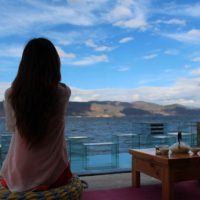We all appreciate that meditation is valuable for stress reduction and similar health benefits, yet spiritual commitment has the potential to take our practice to the next level. What does it mean to make a commitment to the spiritual path? What are the qualities that inform our meditation? A medieval text, the Viveka Chudamani, attributed to the great teacher of Vedanta, Shankara, offers steps to spiritual commitment that are as fresh and vital today as they were centuries ago.
Separating Water and Milk
The first step of commitment offered by Vedanta is viveka or discrimination. In Ayurveda, the digestive process is described as an act of viveka because in digestion we’re splitting, separating proteins into amino acids, separating carbohydrates into sugars—and then putting everything in its proper place. So viveka is our quality of discrimination. Fundamentally it is our ability to separate the real from the unreal. This is traditionally portrayed as a royal swan, said to have the ability to separate water from milk. We need to be that hamsa, that swan who can separate the water from the milk. As the Bhagavad Gita says: The unreal never is; the real never is not. This truth indeed has been seen by those who can see the true.
The world of appearance or maya is a world in which things, though empty of essence, do appear and, though appearing to us, are actually empty of essence. E=mc² means that matter and energy are simply different manifestations of the same thing. This idea, expounded by Einstein, was expressed much earlier in Indian philosophy. “Form is emptiness, emptiness is form.” (Prajnaparamita Sutra) The world in which we live is not exactly unreal, indeed, it appears to our sense organs as very real. We don’t want to put down the world of relative reality because we have to live in it. But we have to be able to distinguish the relative from the absolute.
This is traditionally portrayed as a royal swan, said to have the ability to separate water from milk. We need to be that hamsa, that swan who can separate the water from the milk.
Once there was a student living in a forest ashram. One day, his guru tells him, “Everything is Brahman.” The student is walking in the forest, trying to digest the lesson that ‘all is Brahman,’ when suddenly a mahout, an elephant trainer, comes running through the forest shouting, “Out of the way, mad elephant, mad elephant!” The boy thinks, “I shouldn’t worry about the mad elephant, everything is Brahman.” And he just keeps standing there, saying, “Everything is Brahman, everything is Brahman.” And of course the elephant tramples him. When he doesn’t come home for his dinner, the guru and the other boys go out and they find the student all beaten up by the mad elephant. And when the boy comes around, he says to the guru, “But you told me everything was Brahman!” The guru says, “Wasn’t the mahout also Brahman? Why didn’t you listen to him?” The elephant trainer that was warning him about the mad elephant was also Brahman and needed to be greatly heeded because the essence of everything is only Brahman, the essence of everything is only the all-pervading ground of all being. So we want to separate the real from the unreal, not to despise the relative reality, but to see it for what it truly is, different faces and different facets of the real. When we see it this way, we can play in the relative world, without attachment.
Knowing What to Let Go
That brings us to the step of spiritual commitment, which is vairagya, a sense of renunciation, a sense of being able to let go of whatever is getting in the way of our spiritual journey, of whatever is getting in the way of all being’s benefit. We’re not all going to do this the same way. For each one of us, it is going to be a spectrum. A young spiritual seeker came to my house recently and he said, “I should just give away everything I have to the poor and go to India.” I said, “Hmm, I thought that you were really into partying and drinking and girls, why this sudden fit of renunciation?”
“Well, you see I have all these debts, I’ve run up a lot of credit card debt, this is burdening me,” he responded.
So we talked quite a bit about this, and we came to the understanding that running up a massive credit card debt isn’t a good qualification to give away everything we have and take off to India to bless people. Instead, we decided that a rich uncle would be asked to loan the money to clear off all the debts and then the young seeker would get a job and pay off the rich uncle. At that point if he still felt like giving everything he had to the poor and going to India to bless people, he’d be a little more qualified.
So we talked quite a bit about this, and we came to the understanding that running up a massive credit card debt isn’t a good qualification to give away everything we have and take off to India to bless people. Instead, we decided that a rich uncle would be asked to loan the money to clear off all the debts and then the young seeker would get a job and pay off the rich uncle. At that point if he still felt like giving everything he had to the poor and going to India to bless people, he’d be a little more qualified.
We have to see where we are on the spectrum of vairagya. If we are young and unmarried, in our student phase of life, then we can focus on getting a good start in our spiritual practice. If we are married or have children, elderly parents and other responsibilities, rather than seeing these things as a burden, we can carry out all those duties without being attached to them.
Recently I was on the airport shuttle, listening to an elderly German man who was going to Germany on a business trip. He was nearly seventy and still working. He told the shuttle driver, “You see, I still have debts because I put all my kids through college. But kids shouldn’t have to start their life with debt, that’s my responsibility, and what gives me joy is knowing that my children are happy.” That’s very good householder dharma. He committed himself to giving his children a good start in life; they are not saddled with debt. His children in their turn can care for others.
So when we’re in the householder life, we do need to discharge those responsibilities. Once children are grown and the responsibilities diminish, life could be about more than cruises and golf. Now we have less on our plate, perhaps we don’t have to live in such a big house. We can cut down our material needs to create less stress and more time for meditation and selfless service. That phase of life, the empty nest phase, when the children are grown, when the elderly parents are taken care of or have gone on their journey to other worlds – that phase of life when our responsibilities leave us; its not about, “Now is the time for fun for me that I never had before.” This is a betrayal of our elderhood. It’s a time to do our spiritual practice and to serve others.
As we get towards the end of life, even the concerns of service diminish. The truth is, for each one of us, young or old, we could look into the face of death on any day. But as we get older, death draws closer. And once we are elders, it’s essential to have an intense focus on all that is really important, which is the inner life. The only way to prepare for death is to live now; the only way to prepare for death is to practice now. As we move along in our life journey, more and more things will need to be weeded out. That’s an aspect of the meaning of vairagya. We can be completely living in detachment in our everyday life. I was taught this by a Hindu housewife, my Hindi teacher when I lived in Pune. She said to me, “Look I’m a woman, my husband, my daughter, my future grandchildren need me, I cannot go away to the Himalayas to meditate. But through the practice of nishkama karma yoga, through doing all my actions without clinging to them, without having a desire for the fruit of my actions, I can attain everything.”
Ultimate Concern
Now that we have divested ourselves of entanglements by means of viveka and vairagya, it is time to enrich ourselves in a new way with a treasury of six qualities: sama—serenity, dama—right relation to senses, uparati—satiety, titiksha— endurance, shraddha—faith and samadhana—mental poise. Of these vital qualities, let’s take a moment to look at shraddha.
Shraddha does not mean belief. Shraddha does not mean believing in things, in postulates, in concepts. To affirm postulates and theological concepts is not actually faith; rather it is belief. The protestant theologian Paul Tillich, in Dynamics of Faith, described faith as ‘ultimate concern’, saying, “Faith as ultimate concern is an act of the total personality. It is the most centered act of the human mind.”
Ultimate concern is getting up in the morning, rousing ourselves and knowing that our spiritual path is really important. So faith isn’t the things we believe in, faith is that which makes us get up in the morning in time to do our meditation before we have to go to work. Faith is what makes us come home and take a little time to sit down and meditate before we get dinner or before we go to sleep. That’s what we mean by faith—having some kind of real concern for what’s important.
Our Deepest Thirst
Empowered by shraddha and the other five qualities, we come to the step that enlivens not only our meditation but our entire life—mumukshutva, or the burning thirst for liberation. The great Bengali saint, Ramakrishna, said, “You will see God when you long for God as the barren woman longs for a child, as the man lost in the desert longs for water, as the drowning person longs for air.” That kind of longing is what we have to cultivate.
Today, we may not have this kind of longing. Maybe our longing is a little flickering flame, sometimes seeming to be extinguished by the winds of the world. Yet that fire spontaneously rekindles, again and again. It is the fire of longing that drives you to read these words. We need to cultivate that flame of longing. We need to grow or cultivate a real thirst for spiritual realization. This begins with identifying the thirst we feel. What appears to us as a thirst for alcohol, for marijuana, for sugar, for a faster car, a bigger house, a better job, a younger girlfriend, is simply the longing for liberation under another guise. We crave these things because we believe they will make us happy, or at least less unhappy. Beneath all our cravings and addictions is the longing for genuine and lasting happiness—that is, the thirst for our true nature. As the psalmist said, “As the deer pants for flowing streams, so thirsts my soul for You, my God.” Our practice of meditation and selfless service leads us to genuine happiness.
Oh brother, Oh sister, Don’t waste this precious human birth, On idle pleasures and futile cares, Fame and wealth mean nothing when you die, You can’t take with you even one needle.
This life will vanish like a dream, Or like the stars before the rising sun, Nobody knows when death will come, So take the holy name while you can, And do a little kindness every day Yes, do a little kindness every day.







